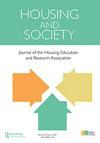争夺稀缺城市的权利:夏威夷公共住房中的密克罗尼西亚人
Q2 Social Sciences
引用次数: 4
摘要
摘要本文关注夏威夷公共住房的居民如何看待大洋洲地理区域密克罗尼西亚的居民。通过对种族多样性样本的深入采访,我们展示了公共住房居民如何污蔑密克罗尼西亚社区成员。一些受访者称,密克罗尼西亚人不公平地获得了极为有限的经济适用房,这可能会使夏威夷原住民和其他“更值得”的当地居民流离失所。其他人则与不负责任或文化上“其他”的父母分享密克罗尼西亚青年的种族主义观点,认为他们不守规矩、暴力。因此,我们的工作表明,受访者如何通过招募关于需求、归属感和应得的替代叙事,含蓄地宣称住房的“权利”;有时会利用对其他群体的污名化的叙事。换言之,许多人将“城市权利”视为一场零和游戏。这些发现促使我们在“城市权”文献中重新构想住房正义的经典框架,以解释不同的归属叙事,包括土著人和国际移民的归属叙事。我们主张扩大住房正义的视野,关注帝国和殖民主义的地方和全球后果,夏威夷公共住房社区对密克罗尼西亚人的种族化和污名化就是明证。本文章由计算机程序翻译,如有差异,请以英文原文为准。
Contesting the right to the city under scarcity: the case of Micronesians in Hawaiʻi’s public housing
ABSTRACT This paper focuses on how residents of public housing in Hawaiʻi view residents from Micronesia, a geographic region of Oceania. Drawing on in-depth interviews with an ethnically diverse sample, we show how public housing residents stigmatize Micronesian community members. Some respondents described Micronesians as unfairly gaining access to a highly limited supply of affordable housing, potentially displacing Native Hawaiians and other “more deserving” local residents. Others shared racist views of Micronesian youth, as unruly and violent, with irresponsible or culturally “other” parents. Our work, therefore, shows how respondents implicitly claim a “right” to housing by recruiting alternative narratives of need, belonging, and deservingness; narratives that sometimes leverage the stigmatization of other groups. Many individuals, in other words, see the “right to the city” as a zero-sum game. These findings prompt us to reimagine classic frameworks of housing justice within the “right to the city” literature to account for differing narratives of belonging, including those of Indigenous people and international migrants. We argue for an expansive vision of housing justice that is attentive to the local and global consequences of empire and colonialism, as is visible in the racialization and stigmatization of Micronesians in Hawaiʻi’s public housing communities.
求助全文
通过发布文献求助,成功后即可免费获取论文全文。
去求助
来源期刊

Housing and Society
Social Sciences-Urban Studies
CiteScore
2.30
自引率
0.00%
发文量
10
期刊介绍:
Housing and Society is the journal of the Housing Education and Research Association (HERA). The journal supports the mission of HERA by providing for the dissemination of research and other scholarly work. Submissions from a broad range of perspectives are encouraged. Topics in housing include: policy, design, social aspects, gerontology, behavioral aspects, energy/environment, equipment, interiors, economics, theory/model development, education, and program development or evaluation. The journal welcomes the submission of original research articles, notes and commentaries. Notes are shorter manuscripts presenting succinct information on housing related to one of the following categories: - Research: exploratory or not heavily theory-based or statistically analyzed - Academic: innovative teaching ideas - Program: development, implementation, and/or evaluation of Cooperative Extension or other housing programming efforts - Policy: examination of policy impact, comparative analysis, and/or need to achieve housing goals - Reviews: books, documentaries, etc.
 求助内容:
求助内容: 应助结果提醒方式:
应助结果提醒方式:


